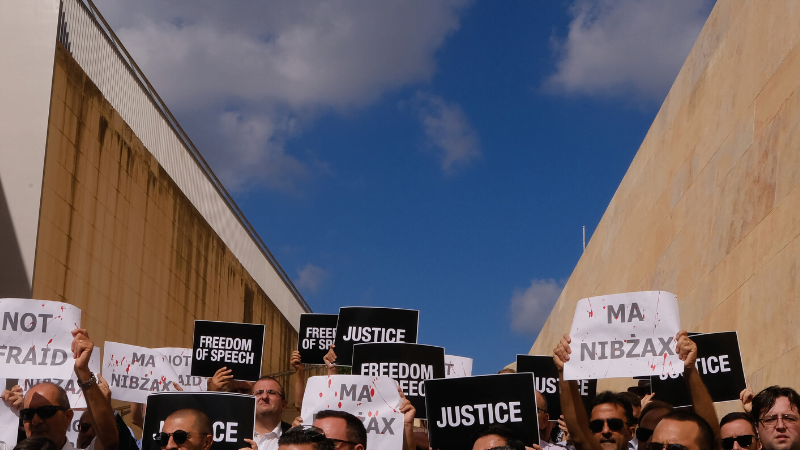Maltese journalists from six independent media houses told a delegation of MEPs from the European Parliament Committee on Civil Liberties, Justice and Home Affairs that they feared for their safety and operated in a culture of intimidation and threats.
Led by Dutch MEP Sophie in’t Veld, the delegation made several visits to Malta last year to follow the murder investigation of journalist Daphne Caruana Galizia – the last one being in December when they left saying they had “serious concerns”.
The MEPs held a meeting with The Shift editor Caroline Muscat, Times of Malta journalist Jacob Borg, Newsbook news editor Sylvana Debono, Lovin’ Malta editor Chris Peregin, Malta Today executive editor Matthew Vella and The Malta Independent editor Neil Camilleri.
The journalists “stressed the general climate of hate, intimidation and constant pressure in which they have to work.” A number of forms of intimidation were mentioned, ranging from physical threats to legal campaigns through libel law suits.
They also highlighted the difficulty they faced when trying to get an official comment, saying they can “hardly access” the government, which was needed “to exert their profession, in particular when it comes to questioning the relationship between the Prime Minister and former chief of staff Keith Schembri, or the Caruana Galizia murder investigation”.
The report also noted how the Labour Party, who was in government, had created an image of them as being enemies. “They referred to an actual campaign orchestrated by the ruling party and directed against independent media presented as public enemies. They reported fearing for their safety,” it said.
Speaking about the Maltese society, the journalists pointed out that “Maltese people, including journalists, are expected to belong to one side or the other and this jeopardises independent media work.”
They also questioned the “absence of investigations” into stories and the “difficulty to access information” about the Maltese Individual Investor Programme or the cash-for-passports scheme.
The conclusive report of the delegation, was discussed this week in the European Parliament’s Committee on Civil Liberties, Justice and Home Affairs where in’t Veld said the fact-finding mission was a “sign from the EU that we care, that we are concerned, that we are present and that we are watching.”
“I think the conclusion was that there was a lot of progress in the murder investigation but there was also lack of progress of investigations into people of interest. We have seen that, since our visit progress has been made, but also where progress should have been made, it just isn’t happening,” in’t Veld added.
Belgian MEP Assita Kanko, who formed part of the delegation, said the findings showed “how serious and urgent the situation in Malta, was, and still is.” She pointed out that the aim of the mission was to gather facts and not act as judge and jury for “each member state of the EU is held to the highest standards”.
“There is still a long way to go before the trust is earned by the Maltese authorities,” she said.
The #EP fact-finding mission report from #Malta is complete. It shows how serious the situation is. I hope that this report will assist the EU in promoting the rule of law, and in highlighting the need for justice for the family of the murdered journalist #DaphneCaruanaGalizia pic.twitter.com/Y1HztpxwP9
— Assita Kanko MEP (@Assita_Kanko) January 9, 2020
In fact, in a meeting with the delegation, lack of trust was listed by prime minister Joseph Muscat as “one of the reasons that lead to his resignation, and he assumed political responsibility for a lack of political judgement on his part.”
The report also highlights a meeting with Attorney General Peter Grech who told the MEPs that the reason middleman Melvin Theuma was granted a presidential pardon in connection with the Caruana Galizia murder while businessman Yorgen Fenech was not, was because of “technical questions of corroboration of evidence”. Fenech is accused of being the mastermind behind Caruana Galizia’s murder.
In their interview with the MEPs, the sons and husband of the murdered journalist said they “have not yet been able to mourn after the murder of their mother and wife as justice has not yet been done”.
In their conclusions, the MEP said they believed that Muscat’s decision to stay in office until mid-January posed a risk to the integrity of the investigation. They also once again called on the government to further implement recommendations made by the Venice Commission, echoing the Council of Europe Special Rapporteur Pieter Omtzigt who has been urging the authorities to do so.
The “lack of investigation” in corruption and money laundering cases were “a source of concern” and recommended “further steps” to be taken to “ensure media freedom and safety for journalists”. Also, ensuring “real support and protection for civil society remains to be achieved.” They also said that the financing of political parties “is an area of concern” and that “clear steps need to be taken to seperate business life from political life.”
As well as in t’Veld, the delegation included MEPs Roberta Metsola (EPP, MT), Birgit Sippel (S&D, DE), Sven Geigold (Greens/EFA, DE), Assita Kanko (ECR, BE), Stelios Kouloglou (GUE/NGL, EL) and Lars Patrick Berg (ID, DE).












